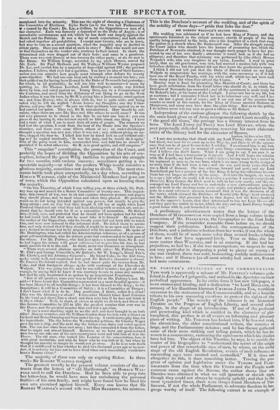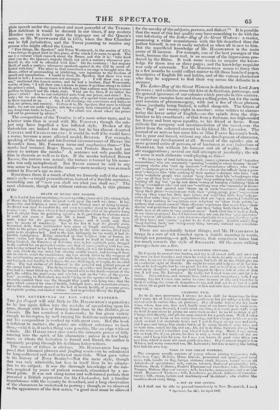MR. FORSTER'S STATESMEN OP THE COMMONWEALTH. THIS work is apparently
a reissue of Mr. Fonsme's volumes pub- lished in LardnePs Cyclopedia, and noticed in the Spectator on their periodical appearance. Iu its entire forum it has new titlepages, a more ornamental binding, and a dedication " to Lord lIom.LAxn, in memory of his illustrious kinsman CnAnr.Es JAMES Fox, worthiest successor to the statesmen of the Commonwealth, and as a humble tribute to his own unceasing exertions to protect the rights of the English people." The novelty of time volumes is an historical Treatise on the Progress of English Liberty, and several other things, in the shape of an introduction. If not of the profound and penetrating kind which is entitled to the character of phi- losophical, this preface is at all events an infortning and pleasant piece of writing. Mr. FORSTER has looked into, if' he has not read, the chroniclers, the older constitutional writers, the statutes at large, and the Parliamentary debates; and he has thence gathered sonic of their more striking and telling points, which he has in. woven in a commentary, embracing the opinions to which his studies have led him. The object (Allis Treatise, he says, is to enable the reader of his biographies to "understand the secret of the origin and power of that remarkable race of' men, by whom, on the awful stage of the old English Revolution, events of such influence to succeeding ages were created and controlled." If it does not altogether do this, it does something better. Tracing the pro- gress of opinion and legislation under the Turmoils and PLAN' TAGENETS from the time when the Crown and the People made common cause against the Barons, the author shows that our liberties were obtained in what we call ignorant or slavish ages, though they could not always be regularly upheld ; and that in the most tyrannical times, there were always found Members of Par- liament, if not the whole Parliament, to advocate freedom in lan- guage worthy of itself. The following extract is an example of plain speech under the greatest and most powerful of the TUDORS. ROW indelicate it would be deemed in our times, if any modern Member were to touch upon the improper use of the Queen's name, as Mr. WENTWORTH did in 1575, when the Star Chamber was in full jurisdiction, and the Tower yearning to receive any
person who might offend the Court. •
" Two things, Mr. Speaker," said Peter Wentworth, in the session of 1575, " two things do great hurt in this place of the which 1 do mean to speak. The one is a rumour which runneth about ;he House, and this it is : ' take heed what you do; the Queen's majesty liketh not such a matter; whosoever pre- ferred' it, she will be offended with him.' On the contrary : her majesty liketh of such a matter ; whosoever speaketh against it, she will be much of- fended with bin,.' rhe other is, that sometimes a message is brought into the House, either of commanding or inhibiting, very injurious to the freedom of speech and consultation. 1 would to God, Mr. Speaker, that these two were buried in hell ; I mean rumours and messages. . . 1 will show you a rea- son," continued this honest orator, and he had a brother, Paul Wentworth, worthy of him, " I will show you a reason to prove it perilous always to follow the prince's mind. Many times it falleth out, that a prince may favour a cause perilous to himself and the whole state. What mire we, then, if we follow the prince's mind? Are we not unfaithful unto God, our prince, and state ? Yes, truly ; for we are chosen of the whole realm, of a special trust and confidence by them reposed in us. . . Sir, I will discharge my conscience and duties to God, my prince, and country. Certain it is, Mr. ;Speaker, that none is without fault ; nu, not our noble Queen, situ her majesty bath committed great fault, yea, dangerous thults to herself. . . No estate can stand where the prince will not be governed by advice."
The composition of' the Treatise is of a more sober taste, and in a better tone than is usual with Mr. FORSTER ; though the sub- ject may have impelled a less inflated style. Dashes of the rhetorician are indeed too frequent, but be has almost deserted CARI.ILE and CHATEAURR IA ND : it would be well if lie would leave a worse, because a more affTted model, Bui.w,:a. For example, speaking of the social and intellectual circumstances of HENRY the Seventh's time, Mr. FORSTER turns and emphasizes thus—' rhe monks had. tortured Roger Bacon, and Francis Bacon bad not arisen to torture the monks." A sentence not only puerile, but false in rhetoric as well as in fact. It' the monks tortured ROGER BACON, the torture was actual; the torture returned by his name- sake was only metaphorical. But 13.■cos cannot be said in any true sense to have tortured the monks—mere monkery was as much extinct in BAcox's age as now.
Sometimes there is a touch of what we formerly called the show- man's style—a turgid personification, instead of a forcible narrative, reminding one of " now you shall see what you shall see." The most elaborate, though not without curious details, is this picture
of the • DEATH or HENRY TUE EIGHTIL
It is fearful, but not unsal Mary, to east a parting glance at it (tIn6 vicious body of Henry the Eighth) after its great work upon the earth was done. It lay, immovable and helpless, it mere torrupt and. bloated mass or dying tyranny. No friend was neiar to comfort it ; not CV (11 a courtier tbtrell to warn it of its coning. hour. The men whom it hail gaged with the orcal or its plunder hung back in itftight from its perishing agonies, in disgust from its ulcerous sores. It could lint move a limb nor lift a lutnd. The pelace doors were made wider for its passage through them ; and, it could only then pass by moms of machinery. Yet to the last it kept its ghastly state, descended dty from bedchamber into room or kingly audience through a hole in the palace ceiling, and was nightly, Isy the same means lifted back again to its sleepless bed. And to the last, unhappily for the world, it had its horrible indulgences. Before stretched in that helpless state of horror, its latest victim had been a Planta„.eenet. Nearest to itself in blood of all its
living k hullo!, the Countess of Salishury was, in her eightieth year, dragged to the scaffold for no pretenthd crime save that of corresisonding.with her son, and, having refused to lay her head. mum the Noel:, (it was for traitors to do so, she said, Which she was not,) hut moving swiftly round, and tossing it from side to side to avail the executioner, she was struck Elwyn by the weapons of the neighbouring men-at-arms; and while her gray hairs streamed with blood, and her neek was forcibly held down, the axe dis'eliarged, at length, its dreadful office. The last victim of all followed in the graceful and gallant person of the young f,ortl Surrey. The dying tyranny, speechless and meapable of mo- tion, had its hand lifted up to allix the formal seal to the death-svarrant of the pact, the soldier, the statesman, and scholar ; and on the 6' day of the execu- tion," according to 1101;1, shed, was itself "lying in the agonies of death." Its miserable comfort then was the thought that ■ oath was dying too ; that the Crave whirls yawned for abused health, indulged lusts, and monstnnts crimes, had in the some instant openest at the feet of manly health, of generous grace, of exquisite genius, and modest virtue. And so perished Henry the Eighth.



























 Previous page
Previous page